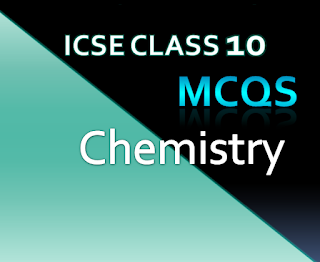ICSE CHEMISTRY ELECTROLYSIS Multiple Choice Questions
Contact 8897306498
For quick revision classes
Electrolysis MCQs - ICSE CHEMISTRY
Choose the correct answer from A, B, C and D for
each of the following statements.
Question 1
The presence of the following is
mandatory for the conduction of electric current though an electrolyte:
A) electrons
B) ions
C) molecules
D) free ions
Question 2
Which of the following statements
is true about a strong electrolyte?
A) undergoes partial dissociation
B) undergoes complete dissociation
C) does not undergo dissociation
D) does not conduct electricity in
its aqueous solution
Question 3
Arrange these cations in the
decreasing order of their tendency to get reduced Mg2+, Cu2+,
Ag1+, Zn2+
A) Mg2+ > Cu2+ >
Ag1+ > Zn2+
B) Mg2+ > Zn2+>
Cu2+ > Ag1+
C) Ag1+ > Cu2+ > Zn2+ > Mg2+
D) Ag1+ < Cu2+ < Zn2+ < Mg2+
Question 4
An example of inert electrode
i) Graphite
ii) Nickel
iii) Silver
iv) Copper
Question 5
The selective discharge of ions
does not depend on
A) concentration of ions
B) position of the ion in the
electro-chemical series
C) electrolyte
D) nature of the electrode
Question 6
Which of the following ions is
called a spectator ion?
A) Chloride ion
B) hydroxide ion
C) sulphate ion
D) Bromide ion
Question 7
The anode used in the electrolysis
of fused Lead bromide
A) Iron
B) Graphite
C) Copper
D) Silver
Question 8
The electrolyte added to water
during the electrolysis of water:
A) dil. Hydrochloric acid
B) dil. Sulphuric acid
C) dilute Nitric acid
D) Conc. HCl
Question 9
When acidified water is
electrolysed using platinum electrodes ________ gas is released at cathode and
__________ gas at anode in the ratio
_______ by volume.
A) Oxygen,
Hydrogen, 2:1
B) Hydrogen,
Oxygen, 1:2
C) Hydrogen,
Oxygen, 2:1
D) Oxygen,
Hydrogen, 1:2
Question10
Which of the following statements is not
true about the cathode in electrolysis process?
A) Reduction electrode
B) attracts cations
C) accepts electrons from cation
D) donates electrons to cation
Question 11
A weak electrolyte:
A) Fused Lead bromide
B) Aqueous solution of Sodium
chloride
C) dilute Acetic acid
D) Sugar solution
Question 12
During electrolysis of Copper
sulphate solution using Copper electrodes
i) blue colour of the solution
fades
ii) pinkish brown coating on
cathode
iii) anode diminishes in size
iv) cations discharged at cathode
are replaced by anode
A) i) only correct
B) i) and ii) are
correct
C) ii) and iii) are
correct
D) i) is incorrect and
rest all are correct
Question 13
The ions present in acidified water
during electrolysis:
A) H+ , OH1-
B) H1+, OH1-
and SO42-
C) H1+ and SO42-
D) H+ only
Question
14
The
ion which gets discharged at cathode during the electrolysis of Conc. Sodium
chloride:
A) Sodium ion
B) Hydrogen ion
C) Chloride ion
D) Hydroxyl ion
Question 15
During electro-refining a metal
that the anode is made of:
A) pure block of the metal
B) impure block of the metal
C) impure sheet of the metal
D) pure sheet of the metal
Question 16
Anode reaction in electrolysis of
Copper sulphate solution using Copper
electrodes:
A) Cu2+ + 2e-
à
Cu
B) 2H+ + 2e- à
H2
C) Cu – 2e- à
Cu2+
D) 4OH- - 4e-
à
O2 + 2H2O
Question 17
Which of the following compounds
can conduct large amounts of electric current through their aqueous solutions?
A) Sodium chloride
B) Ammonium hydroxide
C) Alcohol
D) Sodium bicarbonate
Question 18
The electrolyte preferred in the
electroplating an article with Silver
A) Silver chloride
B) Sodium Argento (Silver) Cyanide
C) Silver nitrate
D) Silver sulphate
Question 19
During electrolysis process the
electrons lost by the cathode is ________
the electrons gained by the anode.
A) equal to
B) less than
C) greater than
D) independent of
Question 20
Electroplating is the process in
which an _______ metal is coated on a __________ metal.
A) inert, expensive
B) expensive, baser
C) baser, inert
D) active, inert

No comments:
Post a Comment